Let me ask you a controversial question.
What if you were born in a concentration camp?
What if you were raised there?
How would you turn out? Would you be traumatised? Damaged for life? Forever warped by your experience?
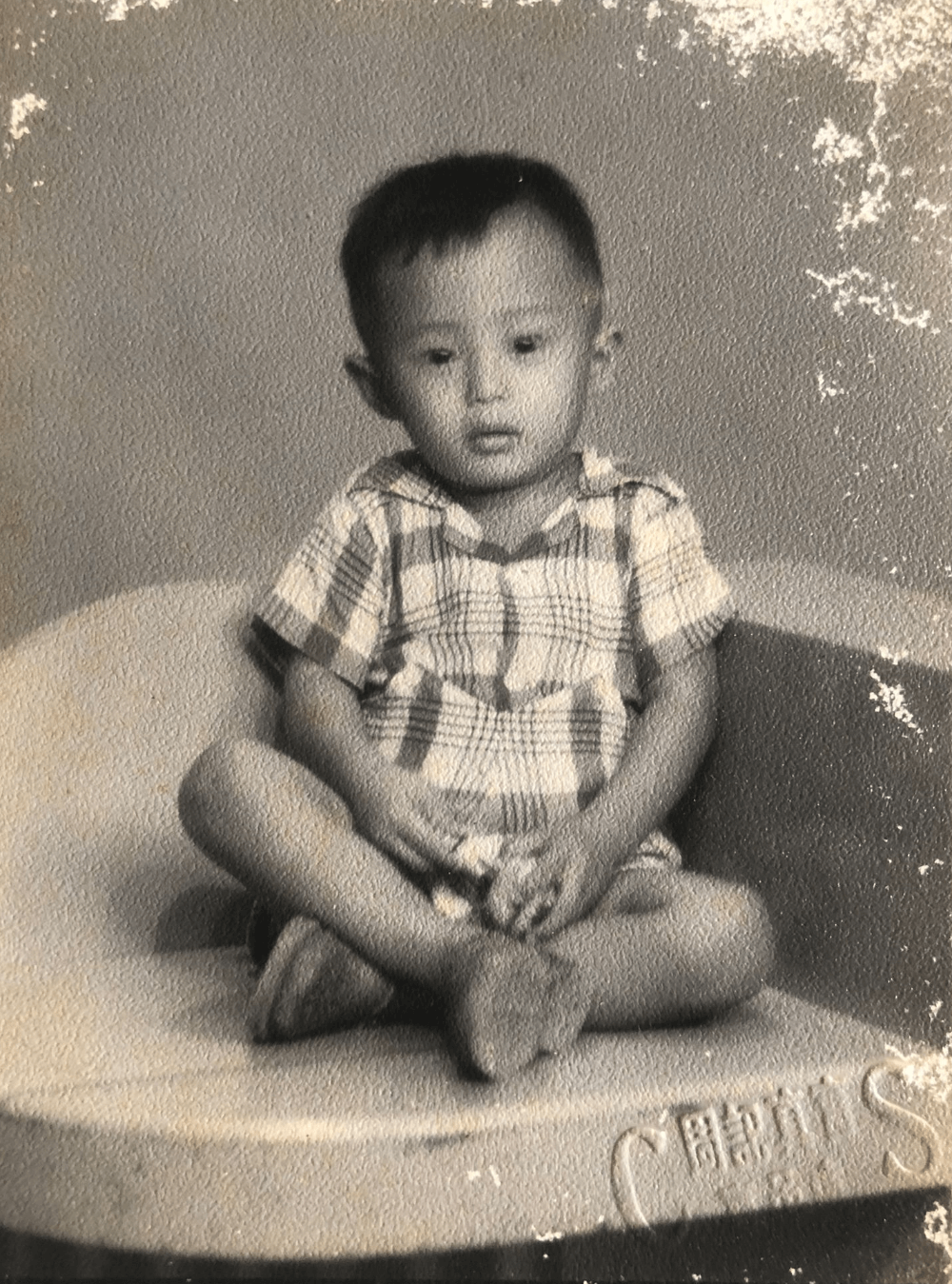
My dad, aged 3. Photo taken in 1958.
Well, the answer may surprise you.
- You see, my dad was born in a concentration camp in Malaysia. And believe it or not, he has happy memories of his childhood.
- He was well-fed. He received good healthcare. He was educated at a Methodist Christian school that was originally set up by British missionaries.
- The atmosphere in his community was a congenial one. People were helpful and honest. They dealt fairly with one another, working hard to improve their economic circumstances.
- My dad’s rural settlement was surrounded by lush and leafy plantations. The main source of income was tapping rubber trees and creating latex. Folks were poor, yes, but they remained positive about the future.
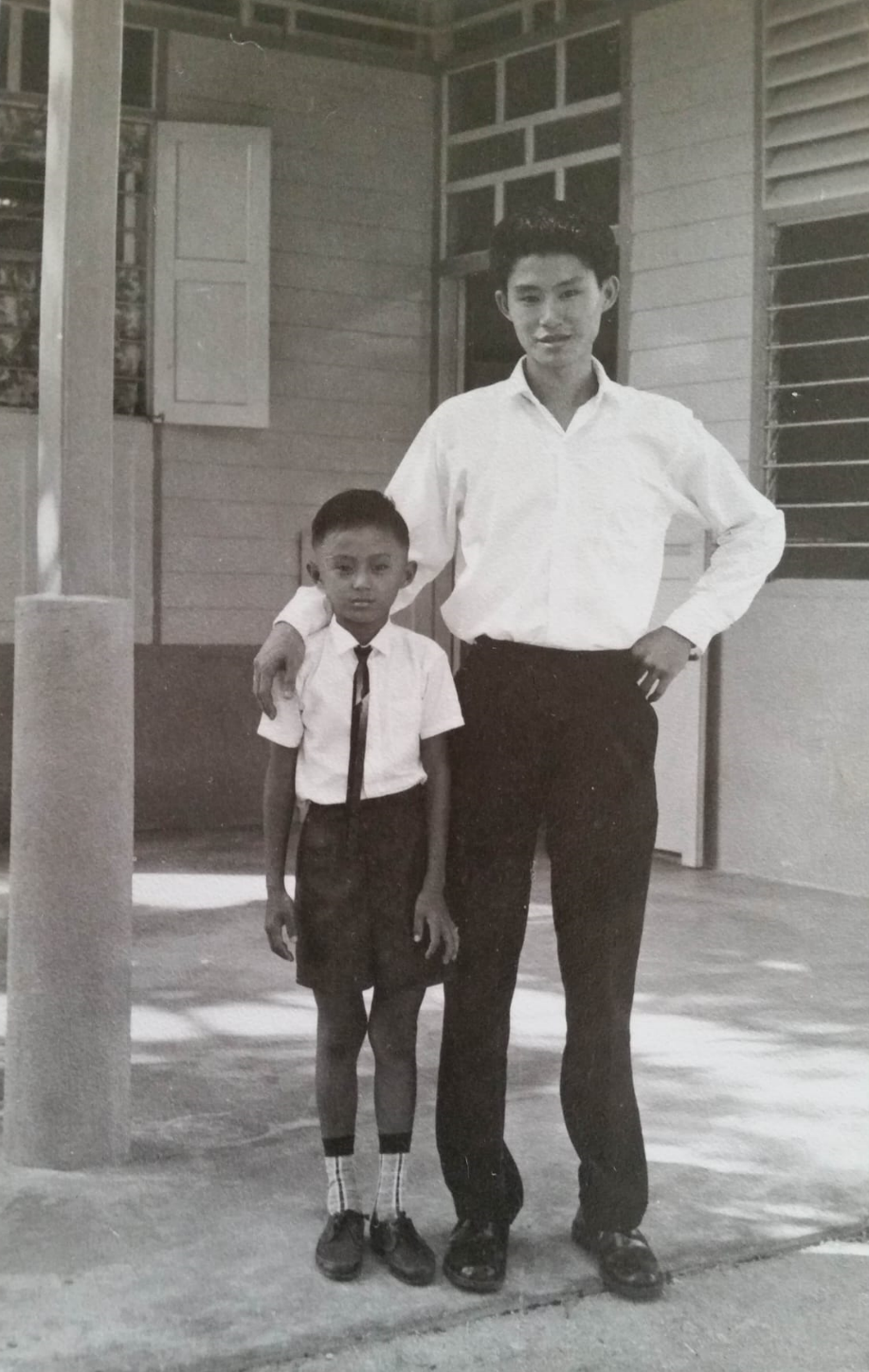
My dad, aged 9, with his older brother. Photo taken in 1964.
Of course, the term ‘concentration camp’ was never used by the British colonial government. Instead, they had a more innocuous term for these settlements. They called them ‘new villages’.
- My dad’s particular new village was in the township of Sitiawan, in the northwest state of Perak.
- Hundreds of such settlements were established throughout Malaysia, sprouting up quickly. This took place during the turbulent period known as the Malayan Emergency.
To understand why these new villages were set up in the first place, you first have to understand the history of Southeast Asia.
- In the aftermath of the Second World War, the region was in the grip of a growing communist insurgency. This was part of a wider trend to topple existing governments.
- The insurgents were inspired by what Mao Zedong had said: ‘The guerrilla must move amongst the people as a fish swims in the sea.’
- The Americans would come to call this threat the ‘domino theory’. And they would escalate their involvement in Vietnam to stop the encroachment of communism.
- The Americans eventually dropped over 7 million tons of bombs on Vietnam, Laos, and Cambodia. It was more than the 2 million tons they deployed during the Second World War. This was brute force. Shock and awe. Earth-shattering firepower.
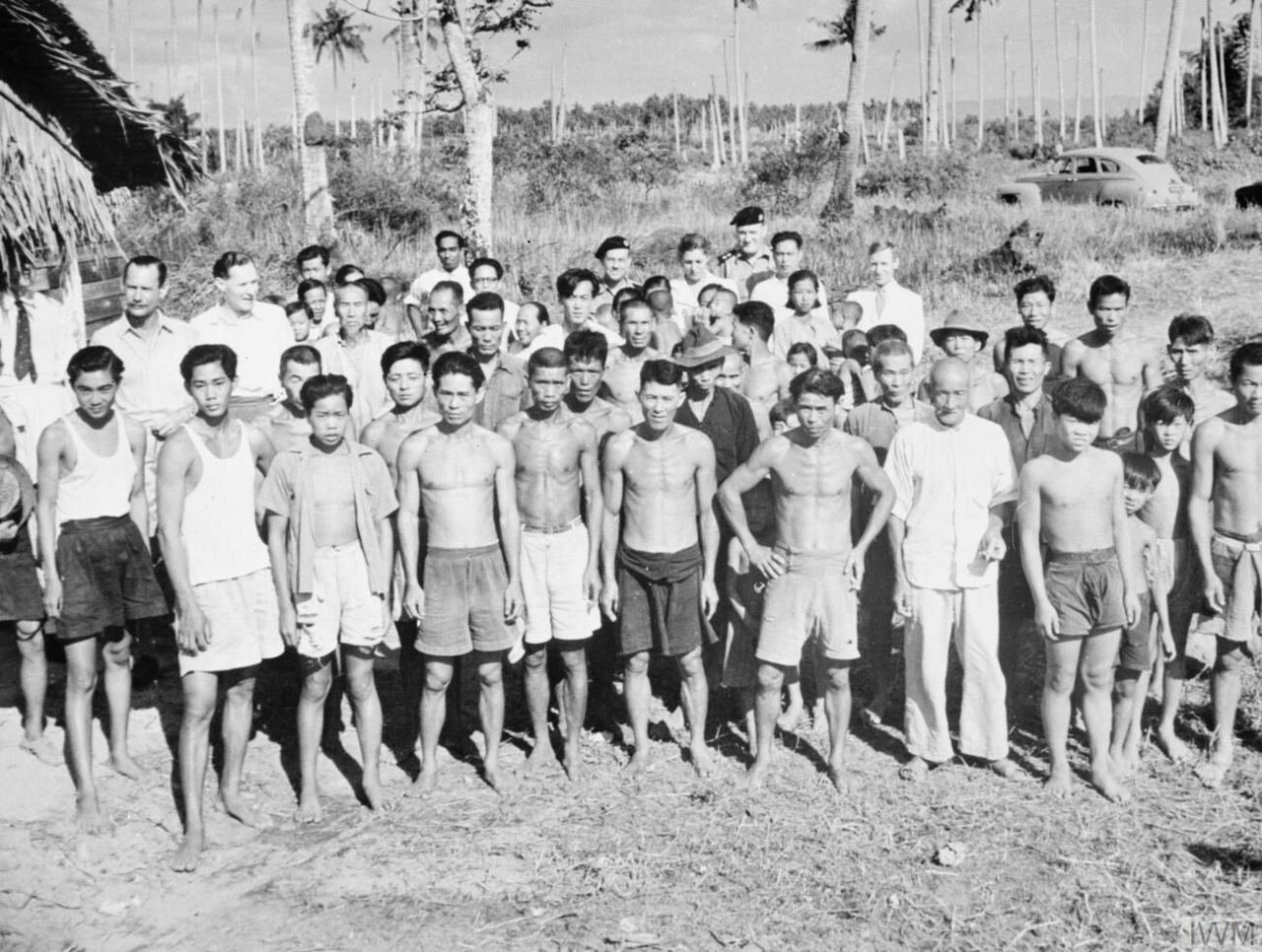
Malayan peasants being uprooted and resettled as part of the Briggs Plan.
The goal was to separate the civilians from the insurgents. Source: Wikimedia Commons
Meanwhile, during the same time period, the British were fighting a counterinsurgency campaign of their own in Malaysia (then known as Malaya).
- However, the British approach would be quite different from the American approach. It was less about raw firepower and more about psychological operations. This strategy was called ‘winning hearts and minds’.
- To achieve this, General Sir Harold Briggs had an ambitious plan. He would forcibly uproot over 500,000 peasants from the rural areas. Then he would resettle them into concentration camps known as new villages.
- This operation became known as the Briggs Plan. The goal was to isolate the civilians from the insurgents. In doing so, the British would cut off material support to the communists, as well as weaken their ideology.

An example of a Malayan new village in the 1950s. Source: Wikimedia Commons
Yes, this was a policy of extreme containment. A form of quarantine lockdown. And, of course, the security measures in these militarised zones were pretty draconian.
- Curfews of up to 22 hours a day were imposed. The villages were fortified with barbed wire. Mass surveillance was carried out. Food was rationed.
- All citizens had to carry identification cards. No one was allowed to enter or leave without permission.
- Paramilitary troops were on constant patrol, watching for signs of communist infiltration. They carried out spot checks and interrogations. If push came to shove, they would shoot to kill.
- Given the situation, you learned never to argue. You simply obeyed. ‘Yes, sir’ and ‘Thank you, sir’ became the correct responses.

Police officers questioning a civilian during the Malayan Emergency. Source: Wikimedia Commons
Of course, this dark period wouldn’t last forever.
- Eventually, the communists were defeated. As the danger melted away, civil rights were restored. A new era of peace and prosperity beckoned.
- My dad was fortunate enough that he was growing up at a time when the barbed wire was being dismantled. The curfews were being relaxed. And the people in his village could enjoy freedom of movement once more.
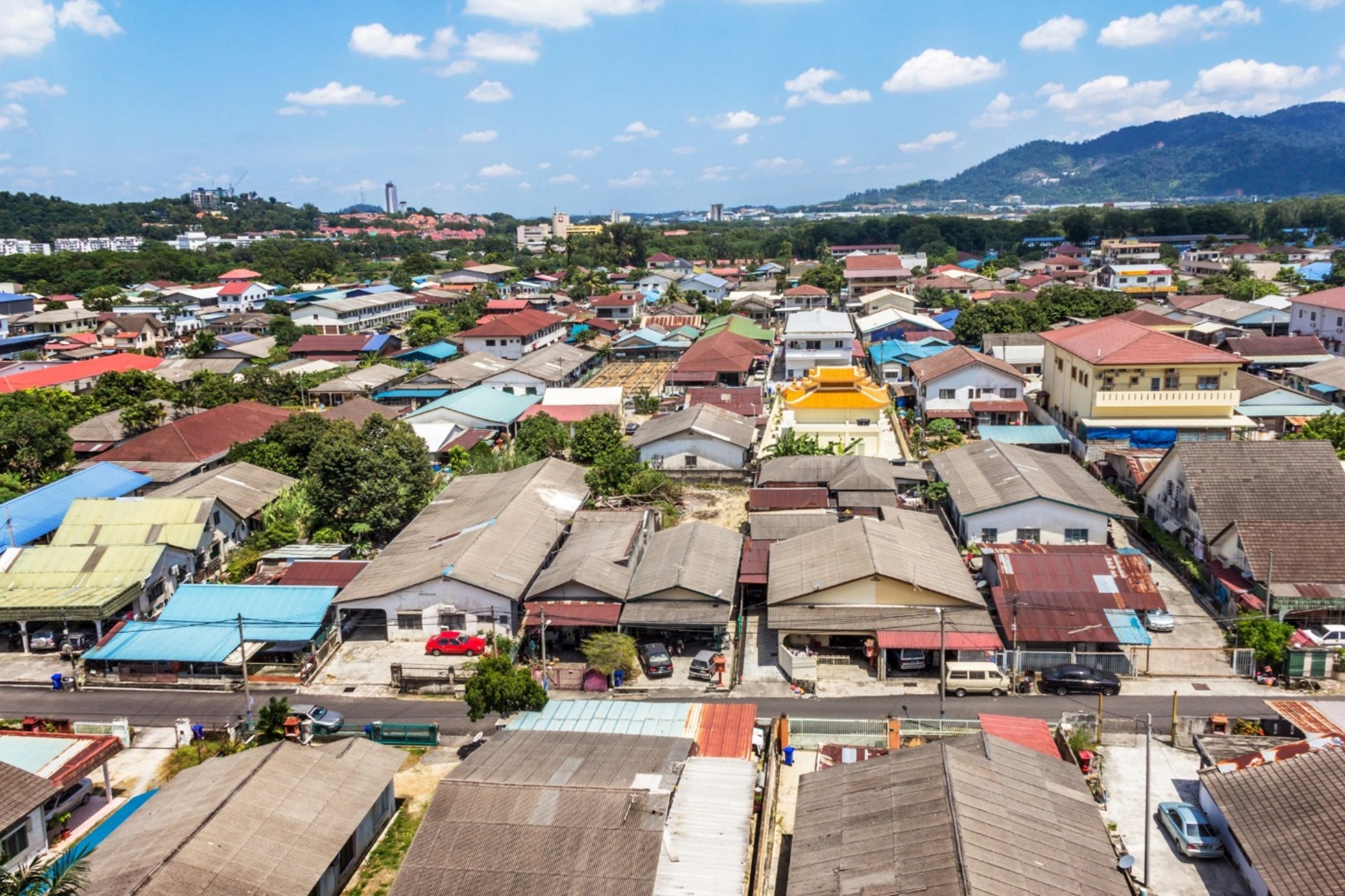
A modern-day new village in Malaysia today. It stands as a historical landmark. A legacy of the British Empire. Source: South China Morning Post
Yes, the 1950s to the 1970s were a turbulent period in the history of Southeast Asia. It was the height of the Cold War. The entire region was engulfed by violent revolution. Millions suffered. Millions died.
- Still, my dad has happy memories of his childhood. For him, the 1950s to the 1970s were actually a golden period. He remains nostalgic for the past. He aches for it. He misses the close camaraderie of village life. Back then, friendships appeared to be largely genuine. Folks were mostly honest.
- But here’s the thing. Such close-knit relationships were only possible because people were dirt-poor and isolated. News about the outside world was limited. The radio and the newspapers only provided sporadic information.
- For this reason, people didn’t find it particularly useful to engage in idle gossip about global events. Instead, they were mostly focused on their immediate survival.
Yes, I know it’s a cliché to say that ignorance is bliss. But in this case, it’s completely true.
- I mean, just think about it. When every day is a struggle to survive, it’s only natural that your viewpoint becomes narrow. Your horizon becomes smaller. You settle for limited choices.
- After all, if the violent conflict didn’t kill you, perhaps diseases like malaria or dengue would. Here’s a sobering fact: during this time, the average life expectancy was only 50 years of age. Almost 20% of children never lived to see their 5th birthday.
Harsh? Absolutely.
- So, given the circumstances, folks living in rural poverty simply learned to be happy and content with what they had in front of them. Small blessings were celebrated, since everyone had so little to begin with.
- In the words of Greek philosopher Thucydides: ‘The strong do what they can and the weak suffer what they must.’
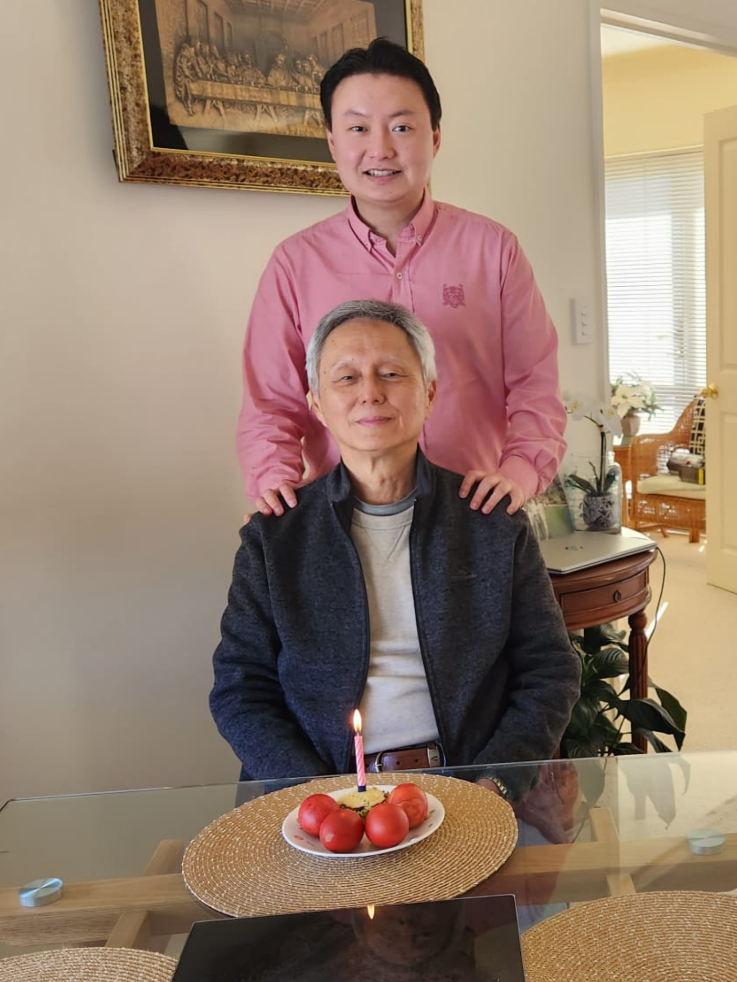
My dad and I during our joint birthday celebration in 2023
Now, let’s fast-forward to the present day. And — gosh — a lot has changed, hasn’t it?
- My dad has made the transition from working class to middle class. Like most Baby Boomers of his generation, he has benefited from upward mobility. Poverty has been replaced by prosperity.
- Along the way, my dad has also experienced a quantum leap forward in technology. One that he could never have imagined when he was a child, growing up in a rural village.
The existence of the internet has opened up a brave new world of knowledge and opportunity for all of us. But this modern convenience is a double-edged sword, isn’t it?
- After all, we now live in an environment that’s increasingly saturated with 24/7 streaming media. We are being bombarded with angertainment and rage-bait. Rumours of the apocalypse are everywhere.
- Perhaps we have more free time than ever. We can doomscroll on any device that we wish. We can partake in any ideological poison that we favour. Around the clock. Across borders.
Now, for my clients with Wealth Morning Managed Accounts, I have no doubt that this has created a higher level of emotional anxiety.
- They will often ask me: ‘Why should I invest when the world is looking so messy? It feels like we’re living in uncertain times.’
- My reply: ‘Well, yes. That’s true. But when has time ever been certain?’
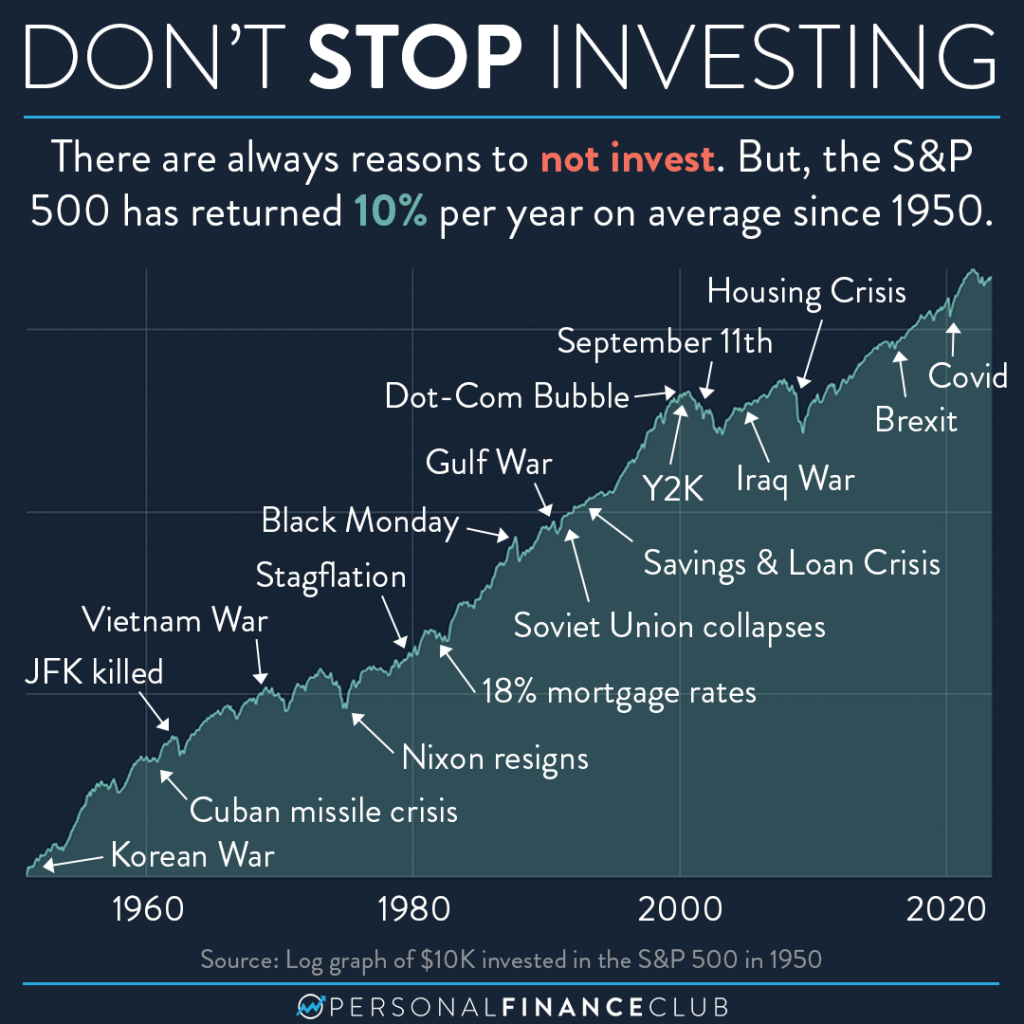
Source: Personal Finance Club
Indeed, here’s the honest truth. All time is uncertain.
- Just a casual glance at my father’s entire lifetime (70 years) reveals a tidal wave of chaos happening in the background. In fact, try as I might, I could not find a single year that didn’t experience an upheaval.
- The good old days? Well, maybe the good old days is a misleading phrase. Maybe the good old days were actually scarier than we dared to remember.
In the movie Fury, there’s this line of dialogue from Brad Pitt that resonates with me: ‘Ideals are peaceful. History is violent.’
- It’s a punchy quote, isn’t it? I think this sums up the human experience. History is a never-ending series of trials and tribulations. It has never been easy.
- Still, human beings are tough and adaptable, aren’t they? Entrepreneurs will always find a way to solve problems. They will find a way to overcome. They will find a way to move forward. And I believe that the vibrant energy of the market reflects this.
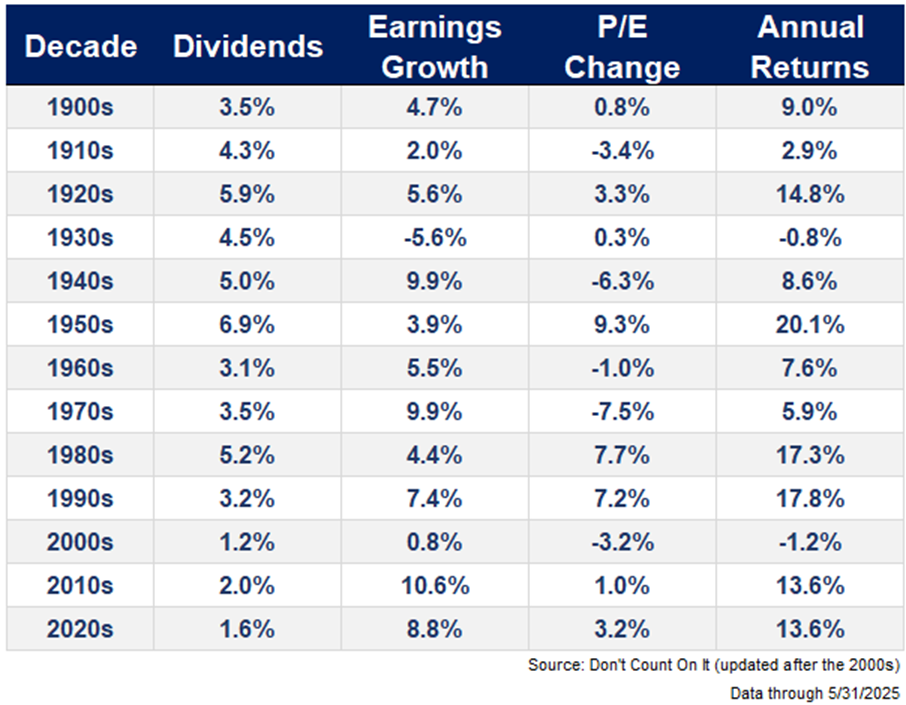
Overall American stock market performance by decade. Source: A Wealth of Common Sense
In uncertain times, I believe that one thing is certain: human progress has always emerged from hardship.
- Lately, I’ve been thinking a lot about my dad’s childhood. It began behind barbed wire. Under armed guard. In a place designed to isolate and control. And yet, through perseverance and faith, he emerged from that hardship. He built a better life. He made the jump from working class to middle class. His future wasn’t guaranteed. But he worked for it anyway.
- I believe that’s the story of every generation, isn’t it? We endure crisis. We navigate fear. We carry on. Because hope demands it.
It’s fair to say that the market does the same. It absorbs shocks. It recalibrates. Then it rises again. Pulled forward by innovation, productivity, and human ingenuity.
- So, despite the scary headlines, here’s what I believe. We shouldn’t let the noise of today rob us of the opportunity of tomorrow. Yes, the angertainment is loud. Yes, the world feels messy. But if we choose to look beyond the short-term fear, we’ll see that the long-term trajectory of history is upward.
- This is why we invest. Not because the times are certain, but because they never are. And yet, despite it all, we rise. We overcome. Indeed, for all its faults and frailties, humanity is much more resilient than we give it credit for.
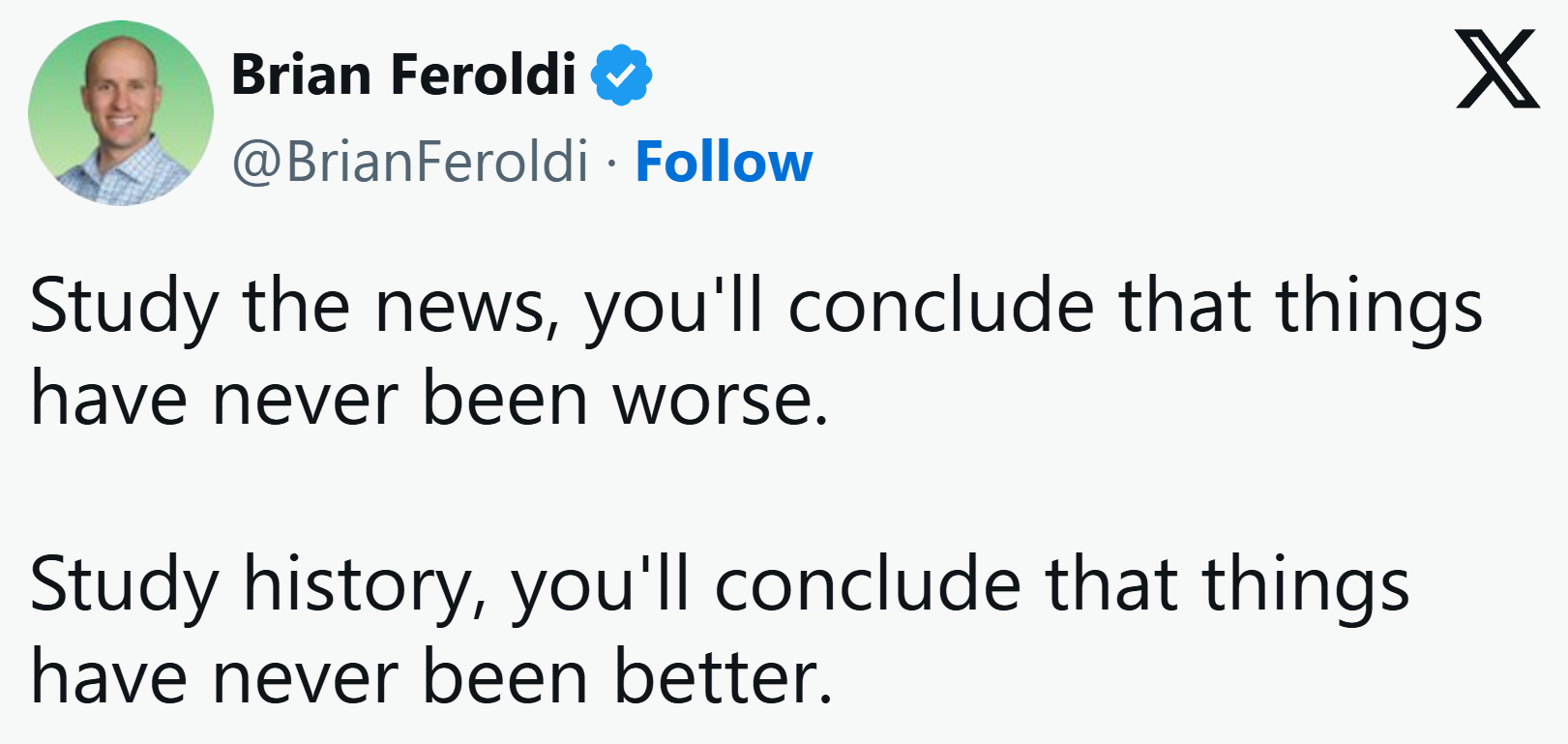
Source: Brian Feroldi / X
It’s time to have your say
I hope that you’ve enjoyed reading our articles as much as we’ve enjoyed writing them:
- Your prosperity is our focus — which is why we are always working hard to uncover new opportunities beyond the radar for you.
By the way, I have a small favour to ask:
- Would you like to write a review of our work here at Wealth Morning?
- Do you want to let us know if our stories have inspired you in a positive way?
- Do you want to let us know if our stories have helped you become a more successful investor?
We truly value your feedback. It encourages us. It helps us to do better. It helps us to reach further:
- So, if you’d like to leave us a review, it’s quick and easy. It will only take two minutes of your time.
- Thank you so much in advance for your kindness and generosity. Your readership keeps us going!
Regards,
John Ling
Analyst, Wealth Morning
(This article is the author’s personal opinion and commentary only. It is general in nature and should not be construed as any financial or investment advice. Wealth Morning offers Managed Account Services for Wholesale or Eligible investors as defined in the Financial Markets Conduct Act 2013.)





John is the Chief Investment Officer at Wealth Morning. His responsibilities include trading, client service, and compliance. He is an experienced investor and portfolio manager, trading both on his own account and assisting with high net-worth clients. In addition to contributing financial and geopolitical articles to this site, John is a bestselling author in his own right. His international thrillers have appeared on the USA Today and Amazon bestseller lists.